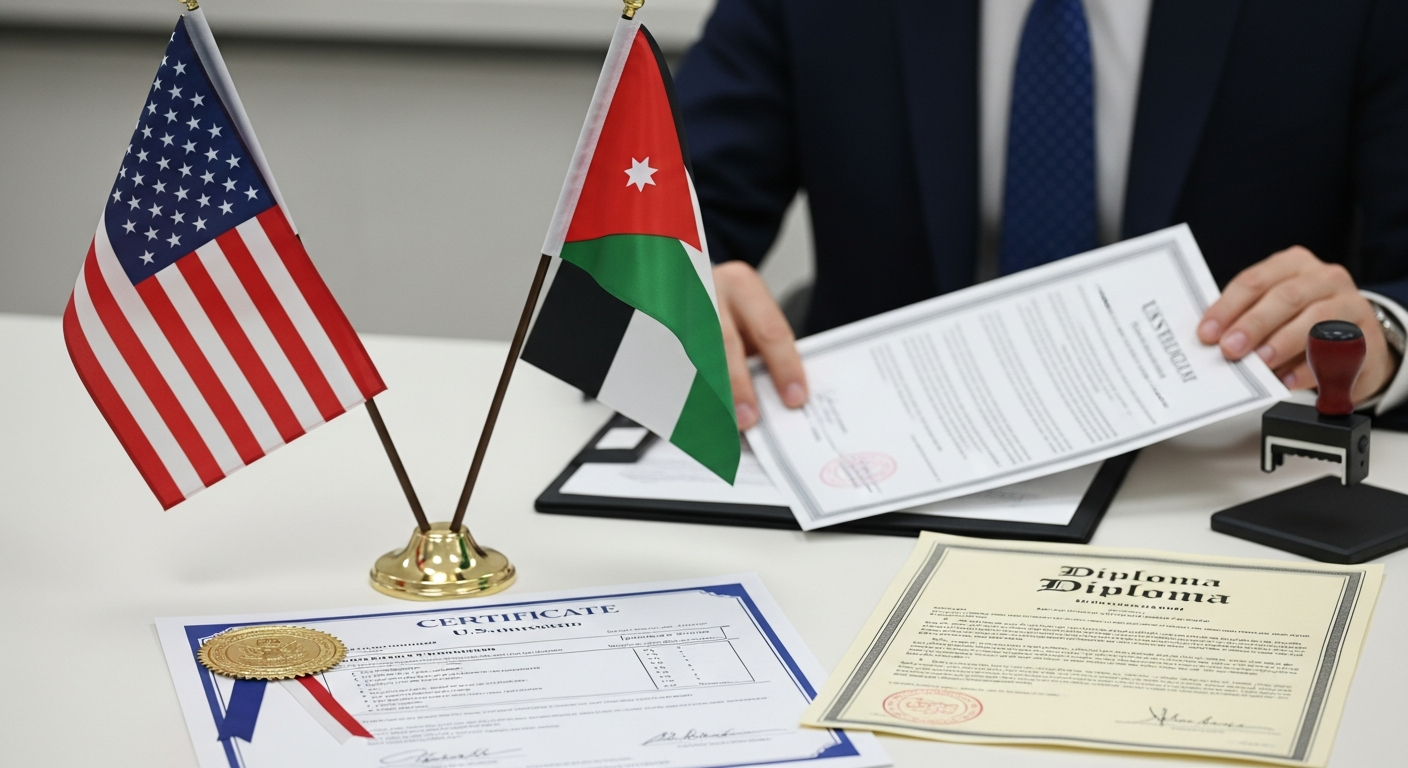
Jordan Embassy Legalization Services in Washington, D.C.
When U.S. documents are intended for use in Jordan—whether for business registration, employment, or personal matters—they must undergo a formal legalization process to be recognized by Jordanian authorities. The U.S. Arab Chamber of Commerce (USACC) assists individuals, corporations, and organizations in preparing, certifying, and legalizing their documents through the Embassy of Jordan in Washington, D.C. This process ensures that all U.S.-issued documents meet Jordan’s legal and procedural standards for authenticity.
Understanding Jordan Embassy Legalization
The legalization process is a mandatory requirement for all U.S. documents to be officially recognized in Jordan. Since the Hashemite Kingdom of Jordan is not a member of the Hague Apostille Convention, documents must go through a multi-step authentication procedure rather than receiving a simple apostille.
Legalization serves as a chain of verification confirming that a document issued in the United States is genuine. It typically involves:
Certification by the appropriate U.S. authority (state or federal).
Authentication by the U.S. Department of State.
Final legalization by the Embassy of Jordan in Washington, D.C.
The U.S. Arab Chamber of Commerce plays a key role in facilitating this process by ensuring each document meets Jordanian Embassy requirements. USACC reviews submissions for compliance, arranges the necessary government authentications, and coordinates directly with the Embassy for final legalization.
Types of Documents Eligible for Legalization
The Embassy of Jordan accepts various categories of U.S. documents for legalization. Each document type must follow specific authentication procedures prior to submission.
Corporate Documents
Documents used for company registration, contract validation, or representation in Jordan include:
Articles of Incorporation or Organization
Certificates of Good Standing
Powers of Attorney (POA)
Partnership Agreements
Business Licenses
Board Resolutions or Authorization Letters
All corporate documents must be signed and notarized, then certified by the Secretary of State before proceeding to federal and embassy legalization.
Personal Documents
Individuals seeking to work, study, or reside in Jordan may need to legalize:
Birth Certificates
Marriage Certificates
Divorce Decrees
Academic Diplomas and Transcripts
Employment Letters or Experience Certificates
These documents must be notarized by a U.S. notary public and authenticated by the respective state authority.
Commercial Documents
Commercial shipments or trade-related documentation often require legalization for customs clearance or verification purposes. Examples include:
Certificates of Origin
Commercial Invoices
Packing Lists
Such documents are typically certified first by the local Chamber of Commerce before being processed by the U.S. Arab Chamber of Commerce and the Embassy of Jordan.
Federally Issued Documents
Documents issued by U.S. federal agencies must first be authenticated by the U.S. Department of State before submission to the Jordanian Embassy. Common examples are:
FDA Certificates (for food, drug, or medical exports)
FBI Background Checks
IRS or Treasury Documents
USDA Certificates
Legalization Requirements and Steps
The legalization process for Jordan involves three primary stages. Each stage confirms the validity of the signatures and seals affixed to the document.
Step 1: State Certification or Notarization
Corporate and personal documents must be properly notarized.
The Secretary of State certifies the notary public’s authority.
In some cases, academic or vital records must be certified by the issuing institution before notarization.
Step 2: U.S. Department of State Authentication
After state certification, most documents are authenticated by the Office of Authentications at the U.S. Department of State in Washington, D.C.
Federal documents skip the state step and go directly to the Department of State.
Step 3: Embassy of Jordan Legalization
The Embassy of Jordan applies its official seal and signature, completing the legalization process.
Processing times and fees depend on document type and volume. Applicants should allow sufficient time for all stages.
Common Mistakes to Avoid
To prevent rejection or delays during the Jordan Embassy legalization process, applicants should ensure the following:
Documents are complete and legible with all pages included.
Notarization is properly executed with the correct notarial wording.
The Secretary of State seal or certification is present where required.
Copies are certified, not plain or scanned reproductions.
Federal documents are authenticated directly by the U.S. Department of State and not through state channels.
Failure to meet these requirements may result in the Embassy returning the documents unprocessed.
How USACC Simplifies the Process
The U.S. Arab Chamber of Commerce assists applicants at every stage of document legalization for Jordan. Services include:
Document review and verification prior to submission.
Coordination with state and federal authorities to secure necessary authentications.
Submission and retrieval from the Embassy of Jordan in Washington, D.C.
Expedited processing options when time sensitivity is critical.
Real-time tracking and status updates for transparency and reliability.
By managing the procedural steps and compliance details, USACC helps ensure that documents are legalized efficiently and in accordance with Jordanian Embassy standards.
Conclusion
Legalizing U.S. documents for official use in Jordan requires careful adherence to authentication procedures established by both U.S. and Jordanian authorities. Each document must pass through multiple stages of verification before it is accepted abroad.
Through its established experience and coordination with government and consular offices, the U.S. Arab Chamber of Commerce facilitates this process to ensure accuracy, compliance, and timely completion.
Applicants are encouraged to follow official guidelines, prepare documents carefully, and contact USACC for professional assistance with Jordan Embassy document legalization in Washington, D.C.
